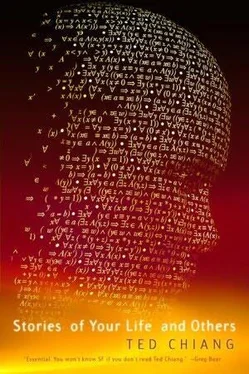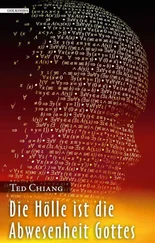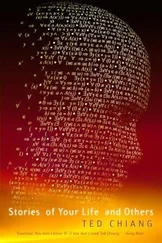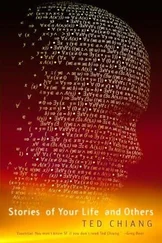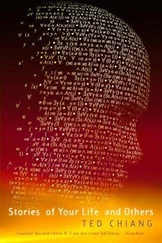Ted Chiang - Division by Zero
Здесь есть возможность читать онлайн «Ted Chiang - Division by Zero» весь текст электронной книги совершенно бесплатно (целиком полную версию без сокращений). В некоторых случаях можно слушать аудио, скачать через торрент в формате fb2 и присутствует краткое содержание. Жанр: Фантастика и фэнтези, на английском языке. Описание произведения, (предисловие) а так же отзывы посетителей доступны на портале библиотеки ЛибКат.
- Название:Division by Zero
- Автор:
- Жанр:
- Год:неизвестен
- ISBN:нет данных
- Рейтинг книги:3 / 5. Голосов: 1
-
Избранное:Добавить в избранное
- Отзывы:
-
Ваша оценка:
- 60
- 1
- 2
- 3
- 4
- 5
Division by Zero: краткое содержание, описание и аннотация
Предлагаем к чтению аннотацию, описание, краткое содержание или предисловие (зависит от того, что написал сам автор книги «Division by Zero»). Если вы не нашли необходимую информацию о книге — напишите в комментариях, мы постараемся отыскать её.
Division by Zero — читать онлайн бесплатно полную книгу (весь текст) целиком
Ниже представлен текст книги, разбитый по страницам. Система сохранения места последней прочитанной страницы, позволяет с удобством читать онлайн бесплатно книгу «Division by Zero», без необходимости каждый раз заново искать на чём Вы остановились. Поставьте закладку, и сможете в любой момент перейти на страницу, на которой закончили чтение.
Интервал:
Закладка:
Division by Zero
By Ted Chiang
Dividing a number by zero doesn't produce an infinitely large number as an answer. The reason is that division is defined as the inverse of multiplication; if you divide by zero, and then multiply by zero, you should regain the number you started with. However, multiplying infinity by zero produces only zero, not any other number. There is nothing which can be multiplied by zero to produce a nonzero result; therefore, the result of a division by zero is literally “undefined.”
Renee was looking out the window when Mrs. Rivas approached.
“Leaving after only a week? Hardly a real stay at all. Lord knows I won't be leaving for a long time.”
Renee forced a polite smile. “I'm sure it won't be long for you.” Mrs. Rivas was the manipulator in the ward; everyone knew that her attempts were merely gestures, but the aides wearily paid attention to her lest she succeed accidentally.
“Ha. They wish I'd leave. You know what kind of liability they face if you die while you're on status?”
“Yes, I know.”
“That's all they're worried about, you can tell. Always their liability—”
Renee tuned out and returned her attention to the window, watching a contrail extrude itself across the sky.
“Mrs. Norwood?” a nurse called. “Your husband's here.”
Renee gave Mrs. Rivas another polite smile and left.
Carl signed his name yet another time, and finally the nurses took away the forms for processing.
He remembered when he had brought Renee in to be admitted, and thought of all the stock questions at the first interview. He had answered them all stoically.
“Yes, she's a professor of mathematics. You can find her in Who's Who.”
“No, I'm in biology.”
And:
“I had left behind a box of slides that I needed.”
“No, she couldn't have known.”
And, just as expected:
“Yes, I have. It was about twenty years ago, when I was a grad student.”
“No, I tried jumping.”
“No, Renee and I didn't know each other then.”
And on and on.
Now they were convinced that he was competent and supportive, and were ready to release Renee into an outpatient treatment program.
Looking back, Carl was surprised in an abstracted way. Except for one moment, there hadn't been any sense of deja vu at any time during the entire ordeal. All the time he was dealing with the hospital, the doctors, the nurses: the only accompanying sensation was one of numbness, of sheer tedious rote.
There is a well-known “proof” that demonstrates that one equals two. It begins with some definitions: “Let a = 1; let b = 1.” It ends with the conclusion “a = 2a,” that is, one equals two. Hidden inconspicuously in the middle is a division by zero, and at that point the proof has stepped off the brink, making all rules null and void. Permitting division by zero allows one to prove not only that one and two are equal, but that any two numbers at all — real or imaginary, rational or irrational — are equal.
As soon as she and Carl got home, Renee went to the desk in her study and began turning all the papers facedown, blindly sweeping them together into a pile; she winced whenever a corner of a page faced up during her shuffling. She considered burning the pages, but that would be merely symbolic now. She'd accomplish as much by simply never glancing at them.
The doctors would probably describe it as obsessive behavior. Renee frowned, reminded of the indignity of being a patient under such fools. She remembered being on suicide status, in the locked ward, under the supposedly round-the-clock observation of the aides. And the interviews with the doctors, who were so condescending, so obvious. She was no manipulator like Mrs. Rivas, but it really was easy. Simply say “I realize I'm not well yet, but I do feel better,” and you'd be considered almost ready for release.
Carl watched Renee from the doorway for a moment, before he passed down the hallway. He remembered the day, fully two decades past, when he himself had been released. His parents had picked him up, and on the trip back his mother had made some inane comment about how glad everyone would be to see him, and he was just barely able to restrain himself from shaking her arm off his shoulders.
He had done for Renee what he would have appreciated during his period under observation. He had come to visit every day, even though she refused to see him at first, so that he wouldn't be absent when she did want to see him. Sometimes they talked, and sometimes they simply walked around the grounds. He could find nothing wrong in what he did, and he knew that she appreciated it.
Yet, despite all his efforts, he felt no more than a sense of duty towards her.
In the Principia Mathematica, Bertrand Russell and Alfred Whitehead attempted to give a rigorous foundation to mathematics using formal logic as their basis. They began with what they considered to be axioms, and used those to derive theorems of increasing complexity. By page 362, they had established enough to prove “1 + 1 = 2.”
As a child of seven, while investigating the house of a relative, Renee had been spellbound at discovering the perfect squares in the smooth marble tiles of the floor. A single one, two rows of two, three rows of three, four rows of four: the tiles fit together in a square. Of course. No matter which side you looked at it from, it came out the same. And more than that, each square was bigger than the last by an odd number of tiles. It was an epiphany. The conclusion was necessary: it had a rightness to it, confirmed by the smooth, cool feel of the tiles. And the way the tiles were fitted together, with such incredibly fine lines where they met; she had shivered at the precision.
Later on there came other realizations, other achievements. The astonishing doctoral dissertation at twenty-three, the series of acclaimed papers; people compared her to Von Neumann, universities wooed her. She had never paid any of it much attention. What she did pay attention to was that same sense of rightness, possessed by every theorem she learned, as insistent as the tiles' physicality, and as exact as their fit.
Carl felt that the person he was today was born after his attempt, when he met Laura. After being released from the hospital, he was in no mood to see anyone, but a friend of his had managed to introduce him to Laura. He had pushed her away initially, but she had known better. She had loved him while he was hurting, and let him go once he was healed. Through knowing her Carl had learned about empathy, and he was remade.
Laura had moved on after getting her own master's degree, while he stayed at the university for his doctorate in biology. He suffered various crises and heartbreaks later on in life, but never again despair.
Carl marveled when he thought about what kind of person she was. He hadn't spoken to her since grad school; what had her life been like over the years? He wondered whom else she had loved. Early on he had recognized what kind of love it was, and what kind it wasn't, and he valued it immensely.
In the early nineteenth century, mathematicians began exploring geometries that differed from Euclidean geometry; these alternate geometries produced results that seemed utterly absurd, but they didn't produce logical contradictions. It was later shown that these non-Euclidean geometries were consistent relative to Euclidean geometry: they were logically consistent, as long as one assumed that Euclidean geometry was consistent.
Читать дальшеИнтервал:
Закладка:
Похожие книги на «Division by Zero»
Представляем Вашему вниманию похожие книги на «Division by Zero» списком для выбора. Мы отобрали схожую по названию и смыслу литературу в надежде предоставить читателям больше вариантов отыскать новые, интересные, ещё непрочитанные произведения.
Обсуждение, отзывы о книге «Division by Zero» и просто собственные мнения читателей. Оставьте ваши комментарии, напишите, что Вы думаете о произведении, его смысле или главных героях. Укажите что конкретно понравилось, а что нет, и почему Вы так считаете.
